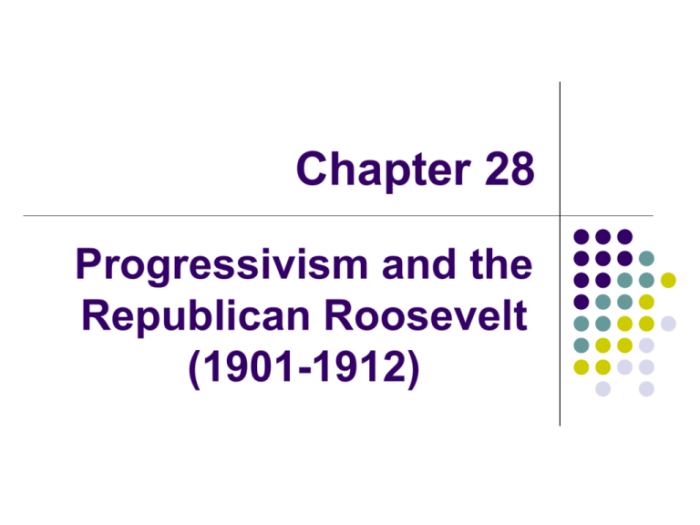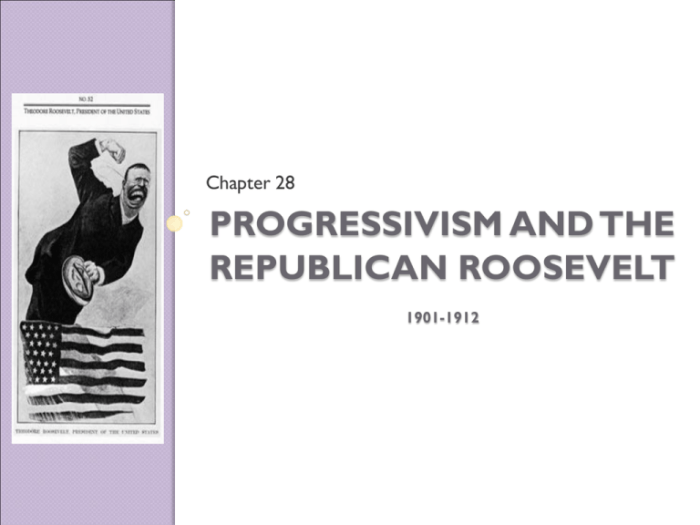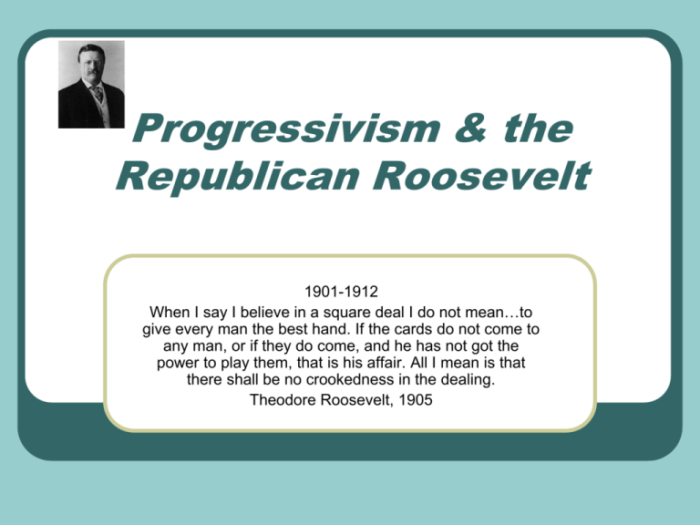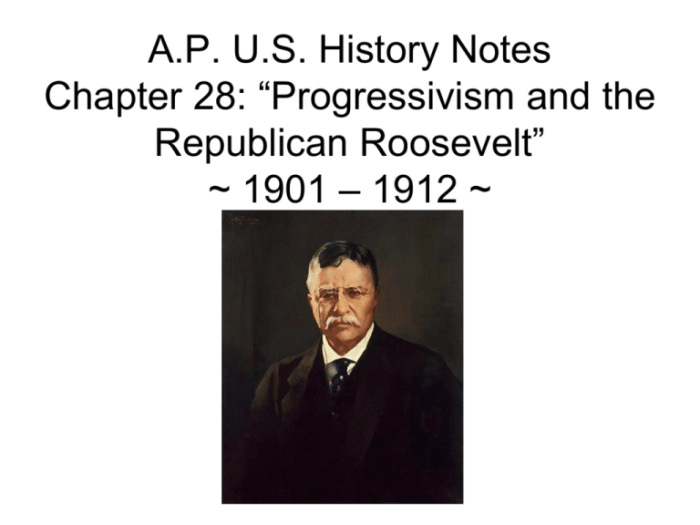Progressivism and the Republican Roosevelt have left an indelible mark on American politics. Theodore Roosevelt’s embrace of progressive ideas reshaped the Republican Party and laid the foundation for the modern welfare state. This essay examines the origins and key tenets of progressivism, discusses Roosevelt’s embrace of progressive policies, and analyzes the long-term impact of his legacy.
The evolution of the Republican Party’s stance on progressivism is a complex and fascinating story. Initially embracing progressive ideas, the party gradually rejected them in favor of a more conservative approach. This essay explores the factors that led to this shift and analyzes the impact of progressivism on the Republican Party’s platform and ideology.
Progressivism and Republican Roosevelt

Progressivism, a political philosophy that emerged in the late 19th century, sought to address the social and economic problems of industrialization. Progressives believed in government regulation of big business, social welfare programs, and political reforms such as direct primaries and women’s suffrage.
Theodore Roosevelt’s Embrace of Progressivism
Theodore Roosevelt, a Republican president from 1901 to 1909, embraced progressivism as a means to curb the excesses of capitalism and promote social justice. He advocated for the regulation of railroads and other industries, supported labor unions, and established the National Park Service.
Examples of Roosevelt’s Progressive Policies and Their Impact, Progressivism and the republican roosevelt
- Hepburn Act (1906):Regulated railroad rates, preventing unfair competition and protecting consumers.
- Meat Inspection Act (1906):Ensured the safety of meat products, protecting public health.
- Establishment of the National Park Service (1916):Preserved natural resources and created recreational opportunities.
The Republican Party and Progressivism

The Republican Party initially embraced progressivism under Roosevelt’s leadership. However, after Roosevelt’s presidency, the party became increasingly divided over the issue.
Factors Leading to the Party’s Initial Embrace and Subsequent Rejection of Progressivism
- Industrialization and Social Problems:Progressives within the Republican Party saw government regulation as necessary to address the problems of industrialization.
- Roosevelt’s Influence:Roosevelt’s personal charisma and leadership played a significant role in shaping the party’s platform.
- Conservative Opposition:Some Republicans opposed progressivism, arguing that it violated individual liberty and free markets.
Impact of Progressivism on the Republican Party’s Platform and Ideology
Progressivism had a lasting impact on the Republican Party’s platform. The party incorporated progressive principles such as government regulation and social welfare into its platform, which it maintained for decades.
Roosevelt’s Legacy and Progressivism

Roosevelt’s progressive policies had a significant impact on American society and laid the foundation for the modern welfare state.
Long-Term Impact of Roosevelt’s Progressive Policies
- Establishment of Regulatory Agencies:Roosevelt’s policies created regulatory agencies such as the Interstate Commerce Commission, which continue to play a vital role in protecting consumers and businesses.
- Social Welfare Programs:Roosevelt’s support for social welfare programs paved the way for the development of programs such as Social Security and Medicare.
- Conservation Movement:Roosevelt’s conservation efforts preserved millions of acres of land and created the National Park Service, which continues to protect natural resources.
Roosevelt’s Progressivism and the Modern Welfare State
Roosevelt’s progressive policies laid the groundwork for the development of the modern welfare state in the United States. His emphasis on government regulation and social welfare programs created a safety net for citizens and laid the foundation for future social programs.
Extent of Roosevelt’s Legacy’s Influence on American Politics
Roosevelt’s legacy continues to influence American politics. His progressive principles have been adopted by both Republicans and Democrats, and his policies remain the basis for many modern social programs.
Progressivism and the Republican Party Today: Progressivism And The Republican Roosevelt

Progressivism remains a relevant force within the Republican Party, although it faces challenges and opportunities.
Contemporary Relevance of Progressivism within the Republican Party
- Fiscal Conservatism:Some Republicans embrace progressive ideas related to social issues while maintaining conservative economic policies.
- Environmental Concerns:Climate change and environmental protection have become important issues for many Republicans.
- Support for Social Programs:Some Republicans support social programs aimed at reducing poverty and inequality.
Challenges and Opportunities Facing Republicans Who Embrace Progressive Ideas
- Conservative Opposition:Republicans who embrace progressive ideas may face opposition from conservative members of the party.
- Balancing Act:Republicans must balance their progressive ideals with the party’s traditional conservative principles.
- Evolving Political Landscape:The political landscape is constantly evolving, and Republicans must adapt their progressive ideas to meet the changing needs of voters.
Potential Impact of Progressivism on the Future of the Republican Party
Progressivism has the potential to reshape the Republican Party and make it more competitive in the future. By embracing progressive ideas while maintaining conservative economic principles, Republicans can appeal to a broader range of voters and strengthen their position in the American political system.
FAQ Explained
What is progressivism?
Progressivism is a political philosophy that advocates for social reform and government intervention to address economic and social problems.
How did Theodore Roosevelt embrace progressivism?
Roosevelt supported a wide range of progressive policies, including antitrust legislation, food and drug regulation, and conservation.
What was the impact of Roosevelt’s progressive policies?
Roosevelt’s policies helped to improve the lives of ordinary Americans and laid the foundation for the modern welfare state.